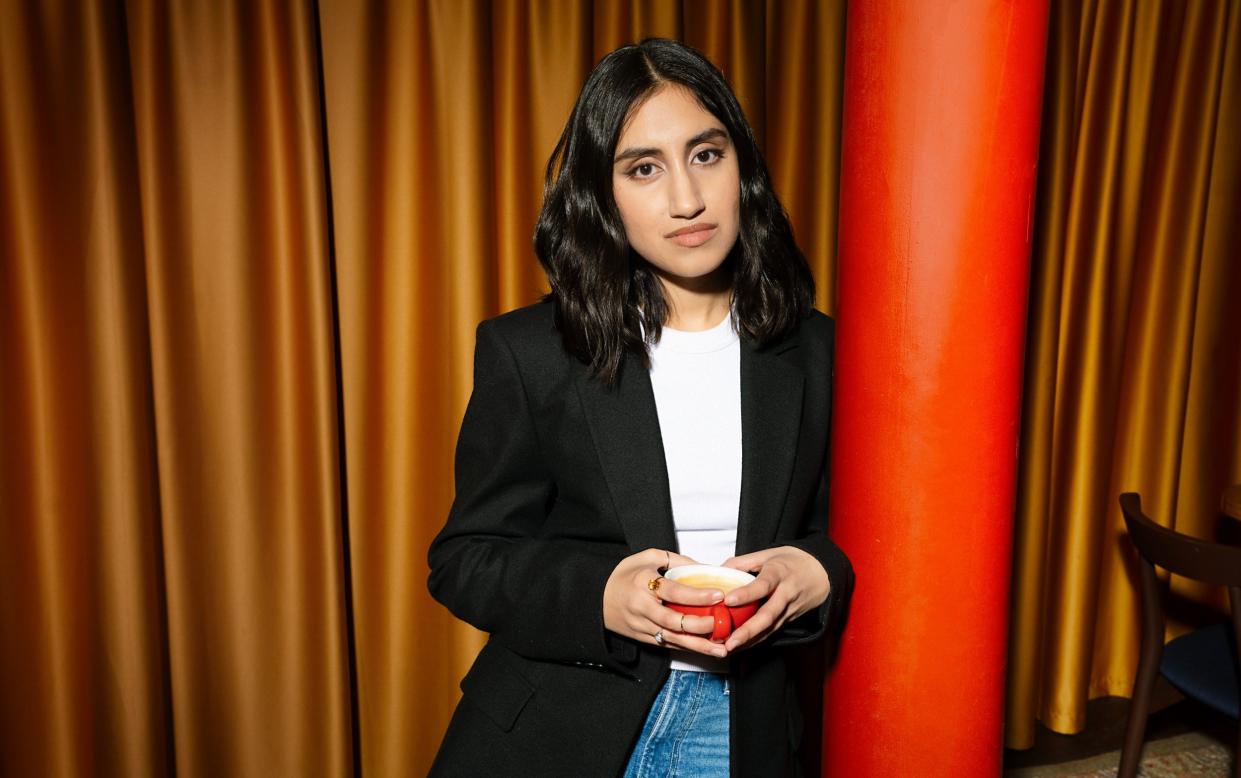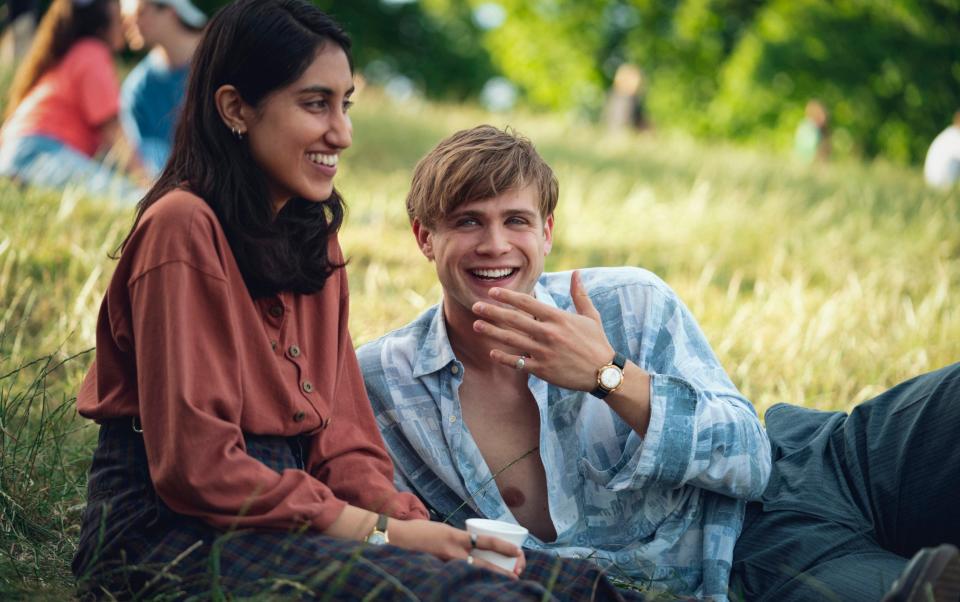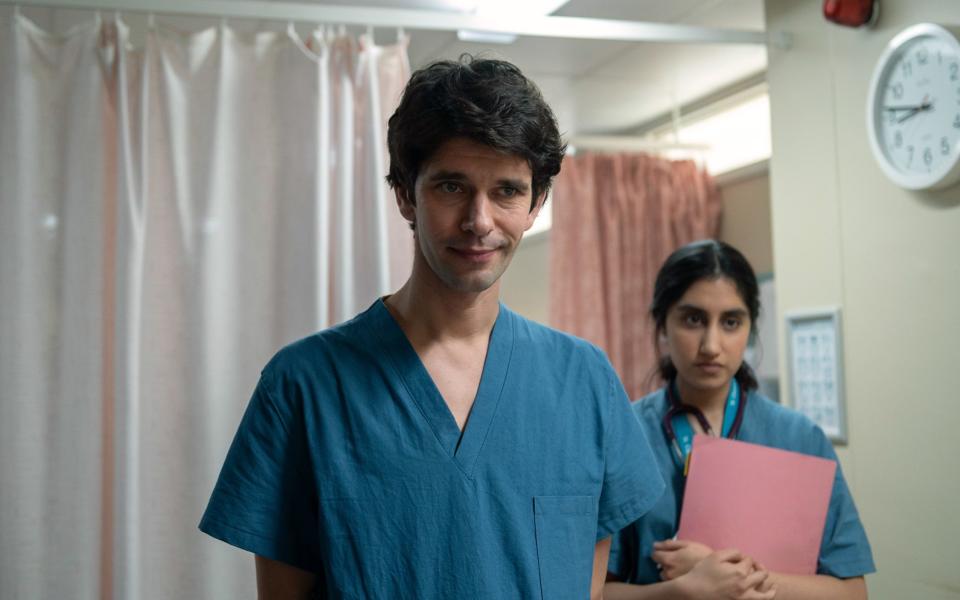One Day star Ambika Mod: 'It's massive that an Asian woman has this role'

“I had a bad experience with boys at high school,” says Ambika Mod. “They’d come up to me, quite regularly, and say, ‘You’re -really ugly.’ S--t like that. That does still inform a lot of who I am.” She frowns, then breaks into a grin. “So I guess that being cast as the romantic lead in a big TV show is pretty validating.”
The show in question is Netflix’s irresistibly bingeable series One Day, adapted from David Nicholls’s best-selling 2009 novel. Mod, 28, best known for her role as trainee doctor Shruti in Adam Kay’s dark medical comedy This Is Going to Hurt, gives a lovably knotty performance as earnest, working-class northerner Emma. On her final day at Edinburgh University in 1988 (July 15, St Swithin’s Day), Emma ends up spending the night with posh southern hedonist Dexter (Leo Woodall – the hunky cockney from The White Lotus). The plot follows their shifting – initially plat-on-ic – dynamic over the next 20 years, as their personal and professional prospects rise and fall. Dex coasts into shallow celebrity, while Em slogs her way through years of waitressing while trying to become a world-changing writer.
Nicholls’s clever conceit of checking in on the pair every July 15 was lost in the unloved 2011 film version, starring Anne Hathaway, which reduced a distinctively nuanced love story to a brittle Holly-wood romance. But – with the space to give a year or two to each of the 14 episodes – the Netflix version is truer to the novel’s tender, witty, tearjerking heart.

“I do relate to Emma,” nods Mod, cautiously, via video link from her home in London. “We’re both hard grafters. People on the outskirts. Emma’s spent three years at the same uni as Dexter and he hasn’t really noticed her. I was also a bit of a wallflower, growing up. I wasn’t invited to parties. I never won a school prize. I never told anybody I wanted to be an actor in case they thought I was deluded.”
Born in Potters Bar, Hertfordshire, in 1995, “introverted, cerebral” Mod is the elder of two daugh-ters born to Indian immigrants. Her accountant mother arrived in the UK as a child and her father (a vet) in his 20s. “I got the part of Mary in the school Nativity when I was seven because I could sing. But although I auditioned for everything at high school, I was never cast in anything. I thought the drama teacher hated me.” The same thing happened to Mod at Durham University. “Maybe I was just a really bad actor,” she muses.
Recognition finally came when she got into the Durham Revue, Durham University’s equivalent to the Cambridge Footlights. “It was by far the most competitive thing I auditioned for,” she says, noting that, “I was always the only woman of colour in the room... anyone whose identity is marginalised might find that ‘funny’ is easier to do. It’s also easier to make fun of yourself than to expect people to take you seriously.”
But Mod took her comedy seriously and was elected president of the Revue in her final year: “I got to make the kind of show I wanted, even though I was in charge of a big group of boys.” She drily notes that this prepared her for graduating into a comedy scene that was still “a boys’ club”. She believes the male dominance of the scene “still -dictates so much of what we find funny, what is considered smart, new and creative. I really struggled with that. I would go on stage and feel that the audience reacted to me very differently to the way they responded to the men.”
In what way? “I had to work so much harder for the laughs. Men were allowed to have fun on the stage in a way that women often can’t.”

After graduation, Mod formed a double act called Megan from HR with her friend Andrew Shires. “When he got a laugh on stage, it really energised him and he played with it. Whereas I’m much less social and chatty. When I’m on stage and I get a laugh, it’s more like a tick-box exercise – ‘OK, that bit worked, that didn’t.’”
Like One Day’s Emma, Mod had multiple jobs while “fighting to get a foot in the door, against the odds” in acting and comedy. She worked at the department store John Lewis and in the finance department of Condé Nast, and did time in the writers’ room for Radio 4 comedies including The Now Show. “But none of my jokes made it to the final broadcast,” she admits.
Mod’s breakthrough came via This Is Going to Hurt, a fictionalised version of Adam Kay’s memoir of the same name, written to expose the pressures under which NHS staff are struggling to operate. Kay’s black humour – he referred to the obstetrics and gynaecology ward as “brats and t--ts” – saw him accused of misogyny by some women, including Milli Hill, author of The Positive Birth Book. Hill claimed that Kay’s characters treated female patients like “slabs of meat”. But Mod doesn’t think the show was sexist. “Childbirth is gory, it’s messy and women do die. I read one article describing it as ‘medieval’.” She believes that the series highlighted the fact that “women’s medicine hasn’t had the financial investment put into it that men’s has”.
After This Is Going to Hurt, Mod found herself frustrated by the ster-eo-typical roles available to Asian women. “Doctors, lawyers and policewomen,” she eyerolls. “These meek, supporting roles that I don’t feel would have been a worthy -follow-up to the three-dimensional humanity we achieved with Shruti. There’s still a long way to go. So it’s massive that an Asian woman has this role in One Day. The impact that will have is not lost on me.”
David Nicholls – who wrote the screenplay for this adaptation – tells me that he saw hundreds of people audition for Emma. “I’d seen Ambika in This Is Going to Hurt and saw she had some of the qualities we needed in Emma: intelligence, dry wit, a certain sense of insecurity and anxiety.” He notes that Dex and Em come of age in the 1980s and 1990s, “So Ambika wasn’t even born until halfway through the -story’s timeline. It was a period drama for her: the rotary phones, the lack of internet, the fact that the characters are already on the housing ladder in their mid-20s.”
He also suspects that the way we seek love has changed. “It was a weird kind of game, back then,” he says. “You went to parties, dinners, the pub and hoped you might chance-meet someone and have a conversation. Nobody stated their situation or intention. Now, people seem more direct. There’s a frankness that I don’t think we had in the 1980s and 1990s, and that’s healthy and good, although I don’t know if anyone seems happier.”
While Nicholls’s One Day is -generally considered a love story, Mod says she sees it as “more about friendship. About how the most long-lasting friendships require some grit and opposition. Em grounds and humbles Dex. What he offers her isn’t immediately -obvious, but as their friendship evolves, you see he’s so sweet and kind with her.”
You certainly fall in love with Emma through Dex’s eyes. So, does Mod feel she’s shown those high-school boys what they were missing? She laughs. “If I were in my ‘villain era’, I’d be cackling, ‘I proved you wrong!’” she smiles and shakes her head. “But I’d prefer to think of my journey as a hero’s arc.”
One Day is available on Netflix from Thursday
